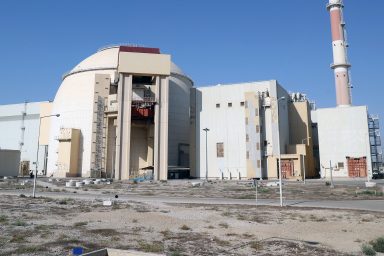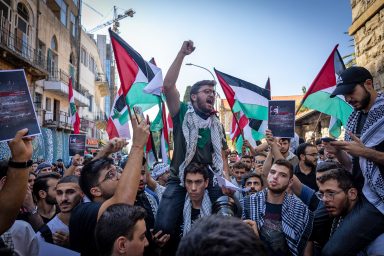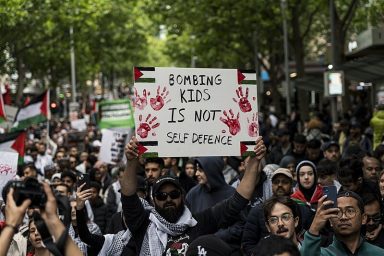After two years of historic economic strife, a tide of anti-establishment sentiment swept Hezbollah from power in Lebanon, but progress will be harder to achieve.
BEIRUT — Celebratory gunfire mixed with fireworks lit up the sky over the capital of Lebanon on Sunday night, as preliminary election results indicated a significant shake-up in the country’s fraught domestic politics.
In what’s seen as a rebuke of powerfully entrenched elites who have ruled the country for decades — and who helped trigger one of the world’s worst economic crises in 150 years — opposition candidates won 13 out of 128 seats in the national parliament.
And in a development with wider implications across the Middle East, Hezbollah — the powerful Iran-backed Shia party — lost the legislative majority that it had enjoyed with allies in government since 2018.
“Today, the people of Beirut returned meaning to the city: a free, diverse, and creative city, and steadfast in the face of autocracy and tyranny,” said Ibrahim Mneimneh, a victorious opposition candidate from the capital city, in a speech on Tuesday.

Paula Yacoubian, an incumbent opposition MP, poses with supporters for a photo during elections on Sunday. Yacoubian was one of 13 opposition candidates to win seats against an entrenched political establishment. Photo credit: Hunter Williamson / WhoWhatWhy
While some voters reacted to the news with cautious optimism, experts warned that resolving a host of issues ranging from widespread poverty to electricity shortages will be much more difficult to achieve.
“I expect, personally, a political crisis at every single turn,” said Mouafac Harb, an independent political analyst who previously worked for The Daily Star, Lebanon’s most reputable English-language daily newspaper, before it shut down in November.
Lebanon’s parliament now lacks a clear majority. Elected lawmakers are divided among competing parties and blocs with vastly different governing ideas and policies, a situation that all but guarantees gridlock when the newly seated lawmakers move to select a new speaker and prime minister in the coming weeks.
Sunday’s election “shows how divided the country is on almost all issues, including the direction of the country,” Harb said.
Tuesday’s final results also signaled significant changes in the power dynamics of establishment sectarian parties in parliament.

A Hezbollah supporter waves the party’s flag while riding in a car in Beirut. Photo credit: Hunter Williamson / WhoWhatWhy
Though Hezbollah lost seats, the paramilitary political party — which is designated as a terrorist organization by the US — and its Shia ally Amal, whose leader Nabih Berri has served as speaker of the parliament, a four-year term, since 1992, mananged to retain all of the seats allocated to Shiites by Lebanon’s sectarian political system, which distributes power on a representational basis among the country’s 18 different religious sects.
However, their non-Shia allies, including President Michel Aoun’s Christian Free Patriotic Movement Party, lost seats, leading to Hezbollah’s fall from the majority it had enjoyed since 2018.
The Lebanese Forces, a staunch rival of Hezbollah, won 18 seats, according to local media, tying with the Free Patriotic Movement and ending the latter’s run as the dominant Christian party.
And hovering over the whole process are questions of how Lebanon is being used as a proxy in a regional power struggle. Experts, including Harb, say that the Lebanese Forces are supported by Saudi Arabia, Iran’s Salafist Sunni rival for dominance in the Middle East. And both the United States and Israel are longtime foes of Iran-backed Hezbollah.

Supporters of Amal, a Shia ally of Hezbollah, wave flags from a car. The Shia parties retained all Shiite seats in Lebanon’s sectarian–based parliament, though their political allies suffered setbacks. Photo credit: ATTRIBUTION GOES HERE
Sunday’s elections came more than two years after the eruption of nationwide anti-establishment movement and a devastating economic collapse that the World Bank has described as one of the worst in modern history, caused by massive government debt and misspending.
More than 80 percent of Lebanon’s 6.8 million people have fallen into poverty, as the Lebanese pound has lost over 90 percent of its value since 2019. Consumer prices have risen more than 200 percent, according to a recent report from the United Nations Special Rapporteur on extreme poverty and human rights, Olivier De Schutter.
De Schutter accused the Lebanese government of committing “human rights violations” through a “man-made crisis” that has forced families to skip meals, young children to take up work, electricity to become scarce or vastly expensive, crucial medicines difficult or impossible to find, and many to emigrate — sometimes at deadly costs — in search of better lives.
Out of these hardships emerged a coterie of new civil society groups like the left-leaning, secular, anti-Hezbollah Beirut Resists, which seeks to oust the sectarian establishment and enact political, economic, and judicial reforms aimed at tackling corruption and rebuilding the country.
The gains achieved by opposition candidates on Sunday excited supporters who hope that new leaders in parliament will improve the political field and introduce policies and programs to tackle the economic collapse and other crises facing the country.
“I don’t expect them to undo completely what happened, but they’re gonna point the country in the right direction,” said Wassim, a 25-year-old computer programmer and supporter of secularism. “There’s only so much you can do when we spiral down to this chaos. It only goes uphill from here.”
Purple ink indicating that the college graduate had cast his ballot stained Wassim’s thumb as he walked out of a voting station in Beirut with his father, Hussam. Though hopeful for change, both men recognized the need to temper their expectations.
“I believe they will do a little change, but not major change,” Hussam, 53, said.

Wassim, right, and his father Hussam hold up their hands to show purple ink indicating they voted in historical national elections in Lebanon on May 15, 2022. Photo credit: Hunter Williamson / WhoWhatWhy
Having achieved a breakthrough in parliament, experts say that the newly empowered and largely pro-secular opposition will face significant challenges as it operates within Lebanon’s sectarian-based system against more powerful establishment parties — while simultaneously seeking to undo it.
Many critics of the system say it favors such sectarian elites and helps sustain not only corruption and mismanagement, but also fear and division that leaders manipulate to keep society divided.
“Our religious differences are what brought us to this situation,” said Ziad Fransawi, a 44-year-old fashion company manager who voted for the opposition. “We should put them aside.”
Mneimneh, who is affiliated with Beirut Resists, said in an interview on Sunday that he would work with other like-minded members of parliament to push for a more secular political model.
“The sectarian system has come to a total collapse,” Mneimneh said. “It’s no longer functioning, and it’s no longer the aspiration of the Lebanese people. We can see the results of this.”
Cynthia Zarazir, another newly elected opposition MP, declared similar intentions.
“It’s a long process, but we have to start and we have to fight, because I think this is one of the main problems of Lebanon, because each religion is supporting a different leader in Lebanon,” she said in an interview Sunday morning.
Experts believe abolishing deeply entrenched sectarianism is wishful thinking, and that sectarian leaders will dole out the benefits necessary to sustain it.
Jobs, benefits, and services are reliant on sectarian connections, cronyism that has been exacerbated by the economic collapse, according to Harb.
“Only a few people from the civil society and the youth are against sectarianism,” he said. “The system itself is based on sectarianism, cronyism, nepotism, clientelism.”
“It’s easier to control your own constituency when they depend on you for their health, education, and now gasoline and your monthly allowance,” he continued. “It’s easier to control it when the country is bankrupt, unfortunately.”

Hamza Othman holds the flag of the Future Movement, the previously premier Sunni party in Lebanon. In January, its leader announced his withdrawal from political life and called on his party to boycott the elections. The lack of a prominent Sunni party and figure in the elections led many Hariri supporters like Othman to boycott the elections or cast their vote for opposition candidates. Photo credit: Hunter Williamson / WhoWhatWhy
Sectarian dynamics were on full display Sunday as constituents waved party flags in motor convoys and hung posters of iconic leaders like Lebanese Forces Leader Samir Geagea and Hezbollah Secretary General Hassan Nasrallah on buildings and cars.
Notably absent in the sectarian scene was a central Sunni figure: Saad Hariri, a former prime minister who abruptly withdrew from political life in January and called on his party, the Future Movement which won 21 seats in 2018, to boycott the elections.
Most obliged to Hariri’s request, with only a few running independently of the party. The resulting power vacuum directed some Sunni votes toward opposition candidates like Mneimneh, Harb observed.
“You cannot explain the outcome of the elections without taking into consideration a major factor, which is Saad Hariri, the leader of a major Lebanese component, withdrawing and suspending his political activity in the country,” he said.
Aya, a 25-year-old Sunni who is a first-time voter and a college graduate, said that she and her mother in the past supported Hariri but on Sunday chose to vote for the opposition.
“[Hariri] was a puppet and nothing changed for us while he was there,” said Aya, who asked not to be identified by her last name.
While the economic havoc is leading many Lebanese to emigrate, Aya said she wants to stay and hopes that the new opposition will be able to solve the crises besetting the country.
“I don’t care if you’re from my religion or not,” Aya said. “I just want someone who can give me a better life.”
While some opted to throw their support behind opposition candidates, others like Hamza Othman chose to join in the Sunni boycott and sat out of the vote entirely.
“We are really sad,” the 21-year-old Hariri supporter said. “Our leader left. We won’t elect anyone but him.”

Banners displaying Lebanese Forces Leader Samir Geagea, left, and MP candidate Ghassan Hasbani hang from a building in a predominantly Christian district of Beirut during elections. Photo credit: Hunter Williamson / WhoWhatWhy
There are doubts that the elections were free and fair. Numerous incidents of electoral violations were reported, including clashes between party participants, intimidation and obstruction at polling stations, fake news circulating on social media, and allegations of vote-buying, according to the European Union Election Observation Mission to Lebanon.
Harb noted that such electoral violations are commonplace in Lebanon and that none likely had a major impact on the outcome of elections.
Al, a young NGO worker who asked only to be referred to by his first name, said he was paid $400 for promising that he and his family would cast a preferential vote for Mohamed Hamoud, a candidate running with the Popular Bloc Party in eastern Lebanon.
Al accepted the money, but said he actually cast his vote for opposition figures.
Though he despises such practices, and questioned whether to accept the bribe, he concluded that choosing to take the money made no difference.
“If I participate or not, it’s not going to change the fact that it exists, so might as well try to get back at them [the corrupt candidates]” by accepting the money, he said.
The independent Lebanese Association for Democratic Elections reported that some of its observers were threatened and beaten by supporters of traditional parties like Hezbollah and the Lebanese Forces.
In the early hours of Tuesday, men carrying Hezbollah flags and chanting slogans in support of the party were seen on video burning the iconic Beirut statue of a fist with the word “Revolution” written in Arabic, erected as a symbol of the opposition movement during massive demonstrations in October 2019.
In a joint statement issued Wednesday, Hezbollah and Amal called on their supporters to cease such actions, local media reported.
“The electoral juncture is behind us and today all parties must return to the approach of dialogue and rapprochement in order to overcome the suffocating economic and financial situation,” the parties said.
With its vast arsenal of weaponry, Hezbollah is widely regarded as the most powerful force in Lebanon. Its weapons, however, have become a highly controversial issue and featured heavily in campaign discourse in the run-up to Sunday.
Supporters of Hezbollah claim that opponents are supported by foreign countries opposed to it and Iran, such as the United States and Israel.
“Geagea and [the leader of Kataeb (Phalanges Party), another Christian rival] Bachir Gemayel, all of their money is from America, and America is in bed with Israel,” said Ali, who asked to only be referred to by his first name because he holds a Netherlands passport. “Hezbollah has problems with Israel, so of course they would say bad things.”
Hezbollah has long defended its right to maintain weapons by claiming they are necessary to protect the country against foreign aggression, particularly from Israel to the south.
“They protect our women, sisters, all of our mothers, not only mine,” Ali continued.
Even if they are not enthusiastic supporters, many people who voted for the Lebanese Forces see it as the only party possibly powerful enough to stand up to Hezbollah, whose close ties with Iran have also stirred fear among some Lebanese about growing Iranian influence in the country and region.
“Lebanon is going through a challenge with two big parties, and you either go with the party that is trying to save Lebanon or the party with Palestine and Iran,” said Joelle Njeim, a 23-year-old Christian who voted for the Lebanese Forces.
A recent law graduate, Njeim wants to stay in Lebanon. She is hoping for positive change, but
she acknowledges that some people may see her decision as being just the opposite.
But she saw the opposition as being too fractured, something that led her to lose faith in it and instead vote for a party many would include as part of the political establishment. In its own way, her choice reflected the dilemma that faced many voters.
“I truly hope I made the right choice.”



